
“There are many things that happened in this war that are clearly war crimes,” Volker Türk, the United Nations high commissioner for human rights, says about Israel’s war on Gaza. Democracy Now!'s Amy Goodman spoke with the top U.N. rights watchdog in Geneva this week at the headquarters of the United Nations Human Rights Council. Türk, who has characterized Israel's actions in Gaza as ethnic cleansing, discusses the ongoing suffering of the civilian population, how Israel has attacked the U.N. and its workers, and why he continues to hope “for both Israelis and Palestinians to live side by side in peace.”
Transcript
AMY GOODMAN: This is Democracy Now!, democracynow.org, The War and Peace Report. I’m Amy Goodman, with Juan González.
I was in Geneva, Switzerland, yesterday, on Monday, at the headquarters of the United Nations Human Rights Council. I had the chance to sit down and speak with the U.N. High Commissioner for Human Rights Volker Türk about a number of issues. In today’s segment, we’re going to look at Israel’s attack on Gaza. We spoke soon after Israel issued new forced evacuation orders for Palestinians in areas of northern Gaza. In a statement last month, Volker Türk characterized Israel’s actions in Gaza as ethnic cleansing, saying, quote, “This latest barrage of bombs, forcing people to move amid the threat of intensified attacks, the methodical destruction of entire neighborhoods, and the denial of humanitarian assistance underline that there appears to be a push for a permanent demographic shift in Gaza that is in defiance of international law and is tantamount to ethnic cleansing,” unquote. I asked Volker Türk about his comments.
VOLKER TÜRK: You must imagine, over the last over 20 months or so, that the population inside Gaza has been displaced multiple times. I’ve heard it directly from some of our staff, who told me that they had to move from the north to the south, back to the north and back to the south, and within these areas again and again. So, it shows a group of people multiply displaced. And with the latest orders, they are essentially now confined to one-fifth of the territory. So you basically ask people to go again to one-fifth of the territory and empty up the land? That’s what prompted me to call it ethnic displacement and ethnic cleansing.
AMY GOODMAN: And just this past weekend, officials in Gaza say at least 81 Palestinians were killed, 400 injured, just over a day period. You have accused Israel of inflicting horrifying, unconscionable suffering on Palestinians. What is your response to the latest developments?
VOLKER TÜRK: Well, you have seen that they established the Gaza Humanitarian Foundation, which is essentially a militarized form of providing humanitarian assistance. We have seen at least over 600 people killed when they tried to go to these distribution points. We used to have — when the U.N. was still able to work a little bit more, we were having about 400 distribution points. Now it’s limited to four or five, and it’s heavily militarized. And as a result, you see people being killed, you see chaos, because the fundamental principles of humanitarian action are not respected. So, yes, humanitarian action is extremely important in these circumstances, and it’s just not happening at the scale and speed that is required in order to save people’s lives.
AMY GOODMAN: Can you talk about Israel’s attack on UNRWA itself, on the U.N. agency?
VOLKER TÜRK: So, the fact that UNRWA was vilified in the way that it was actually shows that there is a total misunderstanding of the role of the United Nations. We are here to provide relief. We are here to help people in need. We are here also in humanitarian action, to do this type of work. Unfortunately, we were not allowed to do it. And UNRWA was the prime target in all of this, which is very, very unfortunate and has, really, real-life consequences.
AMY GOODMAN: Is it a war crime?
VOLKER TÜRK: I mean, the UNRWA, there are many things that happened in this war that are clearly war crimes — you know, collective punishment, issues of denying of humanitarian assistance. It’s a very complex legal issue, how to deal with UNRWA. And, in fact, it’s currently before the International Court of Justice.
AMY GOODMAN: I mean, the number of healthcare workers that have been killed, the hundreds of journalists who have been killed, those that are there to provide humanitarian aid. I just have to ask — the United Nations, some 80 years ago, was founded to end war, promote fundamental human rights, reaffirm international law. When you watch what is unfolding in Gaza, you might think the U.N. is totally useless.
VOLKER TÜRK: Well, the principles are there, and the principles need to be respected. That’s what — let’s not forget how — why was the United Nations created? The United Nations were created after two world wars, horrible, with horrific suffering, 60 millions — 60 million people in Europe alone displaced as refugees, the Holocaust, atrocity crimes, massive violations of human rights. There was a sentiment: “Never again. We are going to establish a world order that respects territorial integrity, independence, that respects human rights and international humanitarian law.” And yes, 80 years later, I’m indeed shocked at what I see around the world, because we have the highest number of conflicts and utter disrespect for international law. And that is worrying and should wake us all up, because we don’t need a world where anarchy reigns and chaos.
AMY GOODMAN: How do you see a ceasefire taking place, after Iran-Israel and U.S. bombing Iran? That happened quite quickly, but not in Gaza. The violence is only intensifying.
VOLKER TÜRK: No, I really hope — my most fervent hope is that there is a permanent ceasefire, that all the remaining hostages are released unconditionally, that indeed humanitarian aid is finally coming in at a scale and a magnitude that is required, and that there will be a political solution, which means a two-state solution. There’s no way around that. And yeah, I mean, and we can never, never give up on any of this, even when, at the moment, it looks very unrealistic. But one should never, ever cast this aside. That’s the only solution, for both Israelis and Palestinians to live side by side in peace.
AMY GOODMAN: That’s Volker Türk, the U.N. high commissioner for human rights. We were speaking at the Human Rights Council in Geneva, Switzerland, yesterday, where he had just given an address about climate change. He says men have stopped wearing ties in Europe, with the heat dome so intense right now. So, next up, we’re going to talk about climate change and the rising temperatures with climatologist Michael Mann. Stay with us.
[break]
AMY GOODMAN: “Rican Beach,” performed by Hurray for the Riff Raff’s Alynda Segarra at our Democracy Now! studio.

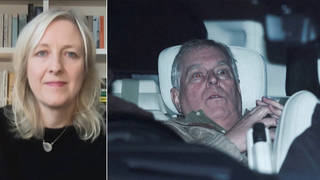
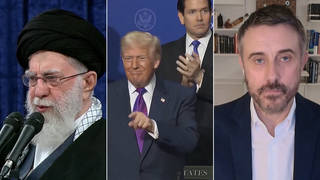
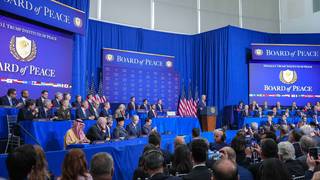
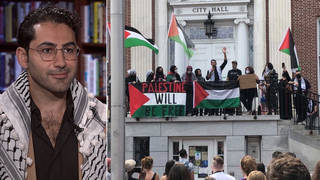






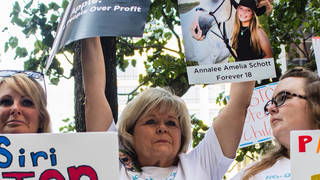
Media Options